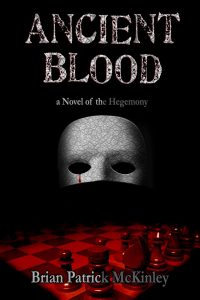 So, I wanted to write a vampire novel. Sounds simple enough, right? For some people, maybe, but not for me. I wanted something (relatively) new; something that had depth and a meaning beyond just another throwaway tale of fangs and stakes.
So, I wanted to write a vampire novel. Sounds simple enough, right? For some people, maybe, but not for me. I wanted something (relatively) new; something that had depth and a meaning beyond just another throwaway tale of fangs and stakes.
How do you start such a thing? Well, I started with my characters as I described in my previous article “Ancient Blood: A Study in Archetypes.” I like to build my stories from the characters outward so things feel more organic. I had a cast of characters I’d created for various purposes or stories over the years, just waiting to be used. That just left the rest of the world.
I tend to be a stickler for realism, even in my fantasy, and the more I thought about what did and didn’t make sense for vampires in the real world, the more I forced myself to seek out explanations for the aspects I couldn’t explain. There were so many other fictional vampires out there, some with good explanations and some with no explanation, but I didn’t want to recycle someone else’s ideas.
I play a lot of White Wolf games involving vampires, werewolves, and other creatures. However, I always loved the idea of being able to tell stories about vampires on their own terms rather than defining the vampire by its relationship to human beings. I wanted my vampires to have a society, a social structure and hierarchy that would inform their behavior and impose certain rules and limitations upon them. I wanted my vampires to be political manipulators with interests that spread beyond survival and the acquisition of blood.
There are a lot of good, practical reasons for vampires to operate inside some kind of structure, not the least of which being safety and increased power. But how to make my society distinctive and original? That took research.
During my research, I came across a multitude of vampire legends across the world, all distinctive and unlike anything I’d seen in the movies and TV. However, I already had a group of vampires that I wanted to concentrate on and I’d already defined the kinds of abilities and limitations I wanted them to have.
During my scientific researching, I’d effectively created a new species of vampire that I chose to call Vampyrs because it sounded more like something that would be the origin of the word vampire. I admit that I was a bit timid—this was my first novel, after all, and I’d already done so much work building the bones—and that I probably could have involved the legendary vampires to a much larger degree. However, I just wasn’t comfortable with the mysticism.
A lot of it came down to the phase I was in as a writer, but also my natural inclination toward realism. I constantly nit-pick movies and shows I watch and I was confident that I could build “a better vampire” without using “magic” to explain anything.

I eliminated several worthy vampires from my pantheon simply due to practicality and taste: they were either too supernatural for me to explain or they were silly or awkward in some aesthetic way. Yes, I’m talking about you, Pennangalan. Also, let’s face it, most folkloric vampires are monstrous animals who would have no place in any kind of society.
Yet some part of me didn’t want to completely crush out the fantasy and supernatural element of the vampire. It’s a conflict within myself that I eventually transformed into a conflict between the Vampyrs of The Order and the indigenous, legendary vampires of world culture.
I determined that my explanation for the strange inconsistency between my Vampyrs and the many divergent myths around the world would be simple imperialism. Ancient creatures such as the Strix, the Upir, the Jiang-shi, the Vetala, the Rakshasa, the Lamia, the Draugr, and the Aswang had existed in various countries in the world and had been eradicated by the Vampyr.
This not only fit The Order’s Western Imperialist style, but also made sense as a means of protecting themselves and the people they wished to control. When they feed, the Vampyrs of The Order are careful and discreet; a stray monster on the loose inflaming fears of vampires wouldn’t do them any good.
Of course, entire races and species are hard to exterminate completely and I kept that in mind. Any one of these races could make an appearance in my series as a survivor of the purge. This gives me an “out” as a writer to re-introduce these elements when I’m ready for them because I’ve already planted the fact of their existence. This is a world-building tip I like to give to other writers: try to plan for everything you might want, even if you don’t know how to use them yet. By leaving openings and “dark places on the map”, you give yourself the opportunity to expand your world without contradicting yourself.
Armed with these ideas, I wrote a timeline in preparation for my script—a massive 20 page document that traced the chronology of The Order’s development from prehistory to antiquity to the modern day. Victories, defeats, treacheries, and alliances, I let history guide and inform the history of my organization: when empires rose and fell, I was able to create a behind-the-scenes story to explain it.
It’s an amusing document to refer back to all these years later, showing my Vampyr’s influence on everything from the Renaissance to the burning of the Library of Alexandria to the American Revolution.
Did you know that the Chicago fire of 1871 was the site of a secret final battle between the Vampyr invaders and the tribes of indigenous shape-shifters that called America their home for centuries? Or that the empires of Charlemagne, Napoleon, and Hitler were all based on one woman’s desire to see the continent of Europe reunited under one banner again? Or that the Cold War was the result of a broken friendship? History can be so much fun.
Ironically, most of these tidbits never made it into my finished novel. In the end, it’s got to be about the characters, so history—however fascinating—has to take a back seat. That’s another lesson for the writers in the audience, but don’t worry, as long as you keep writing new stories, there’s always the chance to find the perfect use for that detail you came up with so long before.
But that’s just my story of world-building. Every author needs to take their own journey and make their own decisions based on what they want. If you don’t care about realism, then go your own way! Honestly, I would love to read a great vampire novel featuring an Aswang or Draugr or even Panangalaan! Let your research lead you somewhere wonderful and personally fulfilling.
Ancient Blood: A Novel of the Hegemony, is available through Amazon on Kindle and paperback. The book has its own Facebook page—over 1,000 likes and counting! Brian Patrick McKinley is also the founder of the Vampire Writers Support Group, which also has its own Social Media Hub. McKinley can be reached through his website and Twitter.
